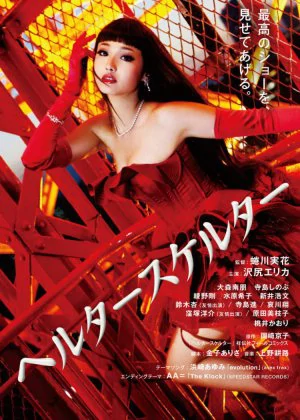Helter Skelter
Movie details

It took five long years before Mika Ninagawa would finally finish the follow-up to Sakuran, her somewhat flawed but still wildly interesting freshman effort. It was a pretty long wait for fans of Sakuran, but Helter Skelter [Herutâ Sukerutâ] was definitely worth it. The result is a fresh, sharp and detailed look into the Japanese pop industry, peeling away the layers of make-up and control in order to reveal a dark cesspool of despair and insecurities.
![screen capture of Helter Skelter [Herutâ Sukerutâ]](/thumbs/img/articles/1200xauto/helter-skelter-1.webp)
Helter Skelter is a pretty straight-forward manga adaptation (the original manga was written by Kyoko Okazaki), though I must say that the manga never really managed to engage (I never got very far in it either). Story and plot points seem to match those of the manga, but the execution is what makes all the difference here. Mika Ninagawa is a pop photographer turned director and finds herself in the perfect position to tackle the themes that are pushed forward in Helter Skelter.
The film plays like a twisted mix of Satoshi Kon's Perfect Blue and Snow White. The first part of Helter Skelter sees a couple of parallels between Ririco's and Mima's trials. A young girl trying to break into different fields of the media in order to sustain her career, a manager (Kaori Momoi) that not only sculpts her pupils but even resembles a live-action version of Rumi and a descent into despair that equals (and even surpasses) that of Mima. The second half of the film reminded me more of the tale of Snow White, only explored through the eyes of the evil stepmother instead of Snow White herself. When newer, younger and fresher fan material starts to steal away the attention from Ririco, it proves to be the final drop in the bucket for Ririco's already fickle state of mind.
Ririco is your archetypical J-Pop idol/model. A product of society, but also a direct product of her manager's dreams and visions. Ririco's dark secret is that she is little more than a marvel of technology. Once an ugly country bumpkin, transformed through plastic surgery to become Japan's biggest pop/fashion phenomenon. Nothing about her is real, still she lives the life of a princess. But Ririco's talent is limited and the attention span of the pop world is short. On top of that Ririco's skin transplants are starting to wither, slowly turning her into a freak of nature.
![screen capture of Helter Skelter [Herutâ Sukerutâ]](/thumbs/img/articles/1200xauto/helter-skelter-2.webp)
Ninagawa is a trained pop photographer, and she uses her past skills to superb effect in Helter Skelter. The film looks absolutely, mindbogglingly beautiful from start to finish. Vibrant colors are jumping out of every frame, camera work and compositions are extremely precise and the indoor settings are all overly detailed and manically structured. This is by far one of the most lushly orchestrated visual experiences I have ever encountered, bar none. The entire film bathes in a lavish J-Pop style, never quite settling on a balance between artistically outlandish and numbingly plastic. It may not be for everyone, but I loved it every second of the way.
The concept behind the use of a fair selection of well-known classical themes is not unlike the musical score of Battle Royale. Famous classical pieces are used in a rather pompous and slightly ironic way. Ninagawa's execution isn't completely tongue-in-cheek though as the music does fit (and co-dictates) the atmosphere of the film. The remainder of songs is nice but not all that special. All in all the film has a pretty nice and memorable score, though not because of the original music.
Erika Sawajiri takes up the role of Ririco which proves to be an excellent choice. She carries the eerie-looking, plastic-fake J-Pop style with conviction and doesn't hold back in what could be considered a pretty edgy part. While she plays a downright annoying brat, she does manage to evoke sympathy for her character, even though most of the time the empathy is hardly warranted. Beside her Shinobu Terajima shines as Ririco's assistant, other smaller parts are reserved for a slew of famous Japanese faces (Anne Suzuki, Susumu Terajima, Nao Omori and even Sho Aikawa, to name a few).
![screen capture of Helter Skelter [Herutâ Sukerutâ]](/thumbs/img/articles/1200xauto/helter-skelter-3.webp)
The principal themes of Helter Skelter may not be all that original (it's definitely not the first film to tackle the shallowness of the pop/fashion industry and films about characters slowly unwinding are far from uncommon), Ninagawa goes about the subject in a very direct and pleasantly unabashed way. She is of course in a perfect position to tackle the material and even though I feel that thematically the film owes a lot to the manga, Ninagawa brings a certain credibility to the table that a film like this deserves.
That said though, Helter Skelter is above all an audiovisual experience. The film looks feverishly beautiful and is madly detailed in every possible way. Every new scene and each new shot is a true marvel. While 127 minutes is quite a stretch for the material at hand, I never felt bored and the combination of lush visuals, strong acting and a fun score prevented the film from ever becoming stale. The entire film is an oddly compelling and insanely stylized fever dream that left me completely dazed and fully perplexed, a rare and significant accomplishment. It's a big step up from Sakuran and even though I feel there is still room for small improvements left and right, this is exactly the type of film that I crave. Here's to hoping Ninagawa doesn't take another 5 years to complete her next film.